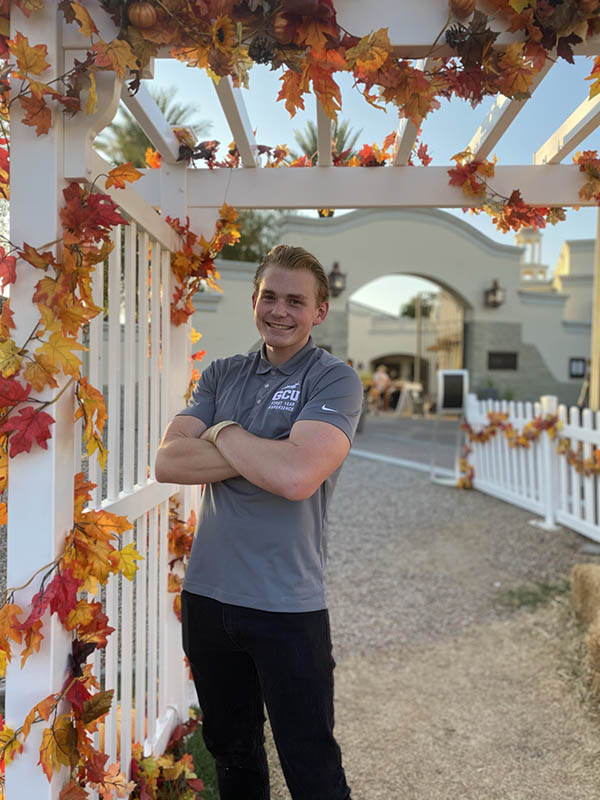
Ethan Connery will be the first in his extended family to walk the Commencement stage in a couple of weeks, so it was important for the Grand Canyon University student to launch into a career that could bring him success. Accounting seemed natural. He was good at it.
But something wasn’t fitting. He didn’t see himself “sitting in a cubicle.” He wanted to be on the go, helping people more personally. When he changed his major to behavioral health science, it might have given some parents pause. It’s not known as a high-paying profession.
Times have changed. A skyrocketing need for mental health services has led to a projected 22% job growth in behavioral health fields from 2021-2031, much faster than average of all jobs, according to the Bureau of Labor Statistics.
So three months after connecting with mental health agency La Frontera EMPACT at a job fair on campus, Connery had an interview in February.
“She offered me a job the same day,” said Connery, who started his position as a crisis response specialist in Phoenix a full month before his April 28 graduation.
He’s doing orientation and then job shadowing for a couple of weeks, so he’ll hit the streets right after graduation. “The legit first week out of college, I’m doing my own thing. It all came together,” he said.
“I’ll be sent out with a crisis response team to offer people help so they don’t end up doing something drastic,” he said.

Connery credits his training at GCU, where coursework offered him “insight into what other people would just label crazy and show you ways to treat it.”
He joins a growing group of GCU behavioral health and counseling majors who are landing jobs well before graduation – nearly 25% of students in the past three years, according to Kathy Britton, chair and instructor of Behavioral Health Sciences and Professional Counseling.
“Part of it is behavioral health is woefully understaffed right now, sort of like in nursing and teaching. So the minute our graduates hit the job market, they are scooped up,” she said.
Or before. Some of her students are already working with autistic children or in care companies in need of behavioral health technicians or hospitals as psych techs.
The addition of an integrated health care model in some large companies sparked a need for more trained mental health professionals, she said.
“And then there was the pandemic. Something about the pandemic really pushed peoples’ need for behavioral health, so we have more hospitalizations and suicide rates went up slightly,” Britton said. “And we also had the great resignation, which affected the behavioral health organizations as well.”
When behavioral health agencies came to campus, she noticed they were armed to offer better pay and more alluring benefit packages, including hiring bonuses and tuition reimbursement, “things we never saw in behavioral health before.”
“And they love our GCU students.”
My parents are so grateful for the University. I’m excited they will see me walk across the stage, already with a job I can attribute to it.”
Leslie Aldous
Interest in behavioral health programs in the College of Humanities and Social Sciences at GCU has grown rapidly, and the number of students studying it is projected to grow by a third next fall, she said, driven by a younger generation that both wants to be of service and sees its promising job outlook.
“They are Generation Z and have grown up in the shadow of the pandemic, so I think that had a lot to do with it,” Britton said. “Boomers started talking more about behavioral health, then Millennials were very open about mental health and the language was normalized. So when this next generation came along it was normalized to another level, focusing on holistic care.”
What they learn in GCU’s growing programs is also helping them land jobs.
When Leslie Aldous sat for her interview at Centria Autism in Phoenix, she began to talk about what she calls a relatively new concept, applied behavioral analysis.
“I was offered the job during the interview because of the knowledge I had,” she said.
She’s already seen her first clients, well before her April graduation, taking classes in the morning while working her new job in the afternoons.
“I wanted to help people, so being able to do it before graduating and to be doing what I envisioned I wanted to do, is awesome,” Aldous said.
“The biggest thing is being able to advocate for someone who isn’t able to advocate for themselves in a way that is received. It allows children to have a higher quality of life.”
And now the first-generation college student could tell her parents that college did pay off.
“GCU has been that missing puzzle piece to what I am achieving. My parents are so grateful for the University,” she said. “I’m excited they will see me walk across the stage, already with a job I can attribute to it.”
Grand Canyon University senior writer Mike Kilen can be reached at [email protected] or at 602-639-6764.
***
Related content:
GCU News: Graduate counseling programs confront crisis
GCU News: First cohort set to help battle mental health crisis



































































